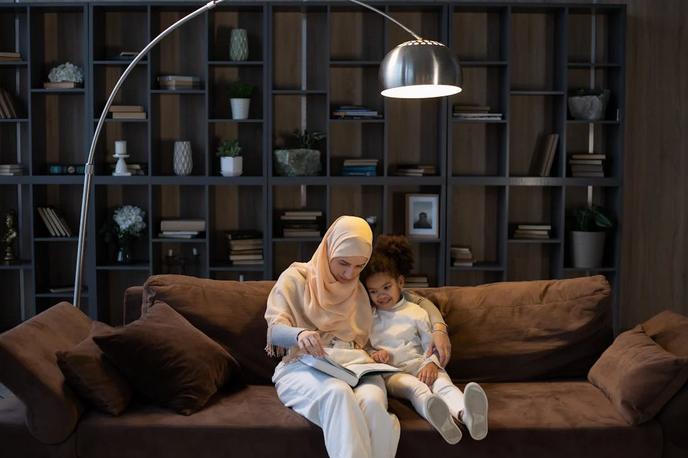ഇസ്ലാമിൽ കുടുംബത്തിന്റെ മൂല്യം എന്താണ്?

ഇസ്ലാമിൽ കുടുംബത്തിന്റെ മൂല്യം എന്താണ്?
1. സമൂഹത്തിന്റെ അടിസ്ഥാനം
ഇസ്ലാമിൽ കുടുംബം സമൂഹത്തിന്റെ അടിത്തറയായാണ് കണക്കാക്കുന്നത്. കുടുംബത്തിലൂടെയാണ് വ്യക്തികൾ മൂല്യങ്ങളും ധാർമ്മികതയും സാമൂഹിക ഉത്തരവാദിത്വങ്ങളും പഠിക്കുന്നത്. കുടുംബബന്ധങ്ങൾ നിലനിർത്തേണ്ടതിന്റെ പ്രാധാന്യം ഖുർആൻ ശക്തമായി ഊന്നിപ്പറയുന്നു. സൂറ അന്നിസാ (4:1) ൽ അല്ലാഹു പറയുന്നു:
“മനുഷ്യരേ, നിങ്ങളെ ഒരു ആത്മാവിൽ നിന്നു സൃഷ്ടിക്കുകയും, അതിൽ നിന്നു അതിന്റെ ജോടിയെ സൃഷ്ടിക്കുകയും, ആ ഇരുവരിൽ നിന്നു അനേകം പുരുഷന്മാരെയും സ്ത്രീകളെയും പരത്തുകയും ചെയ്ത നിങ്ങളുടെ രക്ഷിതാവിനെ ഭയപ്പെടുക. നിങ്ങൾ തമ്മിൽ അവന്റെ പേരിൽ ആവശ്യപ്പെടുന്ന അല്ലാഹുവിനെ ഭയപ്പെടുക; ബന്ധുത്വബന്ധങ്ങളെയും (ഗർഭബന്ധങ്ങളെയും) മാനിക്കുക. തീർച്ചയായും അല്ലാഹു നിങ്ങളെ എല്ലായ്പ്പോഴും നിരീക്ഷിക്കുന്നവനാണ്.”
ഈ ആയത്ത് മനുഷ്യരെല്ലാം ഒരേ ആത്മാവിൽ നിന്നുള്ളവരാണെന്നും കുടുംബബന്ധങ്ങളുടെ പരസ്പരബന്ധവും പ്രാധാന്യവും വ്യക്തമാക്കുന്നു.
2. സ്നേഹത്തിന്റെയും കരുണയുടെയും ഉറവിടം
കുടുംബം സ്നേഹത്തിന്റെയും കരുണയുടെയും പിന്തുണയുടെയും കേന്ദ്രമാണ്. കുടുംബാംഗങ്ങളോടുള്ള ദയയും കരുണയും കാണിക്കണമെന്ന് ഖുർആനും ഹദീസുകളും പഠിപ്പിക്കുന്നു. സൂറ അർറൂം (30:21) ൽ അല്ലാഹു പറയുന്നു:
“അവന്റെ അടയാളങ്ങളിൽ ഒന്നാണ് നിങ്ങൾക്കായി നിങ്ങളിൽ നിന്നുതന്നെ ഇണകളെ സൃഷ്ടിച്ചത്—നിങ്ങൾ അവരിൽ ശാന്തി കണ്ടെത്തുവാൻ. അവൻ നിങ്ങൾക്കിടയിൽ സ്നേഹവും കരുണയും സ്ഥാപിച്ചു. ചിന്തിക്കുന്നവർക്കായി ഇതിൽ അടയാളങ്ങളുണ്ട്.”
ഈ ആയത്ത് കുടുംബജീവിതത്തിലെ സ്നേഹത്തിന്റെയും കരുണയുടെയും മഹത്ത്വം വ്യക്തമാക്കുന്നു.
3. ധാർമ്മികവും നൈതികവുമായ വളർച്ച
വ്യക്തികളുടെ ധാർമ്മികവും നൈതികവുമായ വളർച്ചയിൽ കുടുംബം നിർണായക പങ്ക് വഹിക്കുന്നു. ഇസ്ലാമിക മൂല്യങ്ങളും ആചാരങ്ങളും കുട്ടികളെ പഠിപ്പിക്കാനുള്ള ഉത്തരവാദിത്വം മാതാപിതാക്കൾക്കാണ്. പ്രവാചകൻ മുഹമ്മദ് നബി (ﷺ) പറഞ്ഞു:
“നിങ്ങളിൽ ഓരോരുത്തനും മേയ്പ്പനാണ്; ഓരോരുത്തനും തന്റെ മേൽ ഏൽപ്പിക്കപ്പെട്ടവരെക്കുറിച്ച് ചോദ്യം ചെയ്യപ്പെടും. ഭരണാധികാരി തന്റെ ജനങ്ങളുടെ മേയ്പ്പനാണ്. പുരുഷൻ തന്റെ കുടുംബത്തിന്റെ മേയ്പ്പനാണ്. സ്ത്രീ തന്റെ ഭർത്താവിന്റെ വീട്ടിന്റെയും കുട്ടികളുടെയും മേയ്പ്പനാണ്. ദാസൻ തന്റെ ഉടമയുടെ സമ്പത്തിന്റെ മേയ്പ്പനാണ്.”
(സഹീഹ് ബുഖാരി)
ഈ ഹദീസ് കുടുംബത്തിലെ ഓരോ അംഗത്തിനുമുള്ള ഉത്തരവാദിത്വം വ്യക്തമാക്കുന്നു.
ഇസ്ലാമിൽ കുടുംബങ്ങൾ പാലിക്കേണ്ട നിയമങ്ങൾ
1. വിവാഹവും കുടുംബ രൂപീകരണവും
ഇസ്ലാമിൽ വിവാഹം ശക്തമായി പ്രോത്സാഹിപ്പിക്കപ്പെടുന്നു; അതാണ് കുടുംബത്തിന്റെ അടിസ്ഥാനം. ഖുർആനും ഹദീസും വിവാഹത്തിൽ പരസ്പര സമ്മതവും ദയയും ബഹുമാനവും ആവശ്യപ്പെടുന്നു. സൂറ അന്നിസാ (4:3) ൽ അല്ലാഹു പറയുന്നു:
“നീതിയോടെ പെരുമാറാൻ കഴിയില്ലെന്ന് നിങ്ങൾ ഭയപ്പെടുന്നുവെങ്കിൽ, നിങ്ങൾക്കിഷ്ടമുള്ള സ്ത്രീകളിൽ നിന്ന് രണ്ടോ മൂന്നോ നാലോ വിവാഹം കഴിക്കൂ. എന്നാൽ നീതി പാലിക്കാനാവില്ലെന്ന് ഭയപ്പെടുന്നുവെങ്കിൽ, ഒരാളുമായി മാത്രം (വിവാഹം ചെയ്യുക). അത് അന്യായത്തിലേക്ക് ചായാതെ ഇരിക്കാൻ കൂടുതൽ അനുയോജ്യമാണ്.”
ഈ ആയത്ത് വിവാഹത്തിൽ നീതിയുടെ പ്രാധാന്യം ഊന്നിപ്പറയുന്നു.
2. ദമ്പതികളുടെ അവകാശങ്ങളും കടമകളും
കുടുംബജീവിതം സമാധാനപരമാക്കുന്നതിനായി ഭർത്താവിനും ഭാര്യയ്ക്കും ഇസ്ലാം അവകാശങ്ങളും കടമകളും നിർണ്ണയിച്ചിട്ടുണ്ട്. സൂറ അന്നിസാ (4:34) ൽ പറയുന്നു:
“പുരുഷന്മാർ സ്ത്രീകളുടെ സംരക്ഷകരും പരിപാലകരുമാണ്; അല്ലാഹു ചിലർക്കു മറ്റുള്ളവരെക്കാൾ ശക്തി നൽകിയതുകൊണ്ടും അവർ സ്വന്തം സമ്പത്തിൽ നിന്നു ചെലവഴിക്കുന്നതുകൊണ്ടും. സദ്വൃത്തികളായ സ്ത്രീകൾ അനുസരിക്കുന്നവരാണ്; ഭർത്താവിന്റെ അഭാവത്തിൽ അല്ലാഹു കാത്തുസൂക്ഷിക്കാൻ കല്പിച്ചതിനെ അവർ കാത്തുസൂക്ഷിക്കുന്നു.”
ഈ ആയത്ത് ഭർത്താവിന്റെയും ഭാര്യയുടെയും പരസ്പരപൂരകമായ ഉത്തരവാദിത്വങ്ങൾ വ്യക്തമാക്കുന്നു.
3. മാതാപിതാക്കളുടെ ഉത്തരവാദിത്വങ്ങൾ
മക്കളെ ഇസ്ലാമിക മാർഗ്ഗനിർദേശങ്ങൾ അനുസരിച്ച് വളർത്താനുള്ള വലിയ ഉത്തരവാദിത്വം മാതാപിതാക്കൾക്കുണ്ട്. സൂറ അൽ-ബഖറ (2:233) ൽ അല്ലാഹു പറയുന്നു:
“മാതാക്കൾ തങ്ങളുടെ കുട്ടികളെ പൂർണ്ണമായ രണ്ട് വർഷം പാലൂട്ടണം. പിതാവിന്റെ മേൽ അവർക്കു യോജിച്ച രീതിയിൽ ഭക്ഷണവും വസ്ത്രവും നൽകാനുള്ള ഉത്തരവാദിത്വമുണ്ട്. ആരെയും അവന്റെ ശേഷിയ്ക്കപ്പുറം ബാധ്യതപ്പെടുത്തുന്നില്ല.”
ഇത് മാതാപിതാക്കളുടെ പങ്കിട്ട ഉത്തരവാദിത്വം വ്യക്തമാക്കുന്നു.
4. മാതാപിതാക്കളോടുള്ള ബഹുമാനവും അനുസരണവും
മാതാപിതാക്കളോട് ബഹുമാനവും അനുസരണവും കാണിക്കുന്നത് കുട്ടികളുടെ കടമയാണ്. സൂറ അൽ-ഇസ്റാ (17:23–24) ൽ അല്ലാഹു പറയുന്നു:
“നിങ്ങൾ ആരാധിക്കേണ്ടത് അല്ലാഹുവിനെ മാത്രമാണ്; മാതാപിതാക്കളോട് നന്മ ചെയ്യുക. അവർ വൃദ്ധാവസ്ഥയിലെത്തുമ്പോൾ ‘ഉഫ്’ പോലും പറയരുത്; അവരെ തള്ളിക്കളയരുത്; സൌമ്യമായ വാക്കുകൾ സംസാരിക്കുക. കരുണയോടെ വിനയത്തിന്റെ ചിറക് അവർക്കായി താഴ്ത്തുക.”
കുടുംബത്തിലെ ഓരോ അംഗത്തിന്റെയും ഉത്തരവാദിത്വങ്ങൾ
1. ഭർത്താവ്
- കുടുംബത്തിന്റെ സാമ്പത്തിക ആവശ്യങ്ങൾ നിറവേറ്റുക
- കുടുംബത്തെ സംരക്ഷിക്കുക
- നീതിയും ന്യായവും പാലിക്കുക
പ്രവാചകൻ (ﷺ) പറഞ്ഞു:
“നിങ്ങളിൽ ഏറ്റവും ഉത്തമർ അവരുടെ കുടുംബത്തോടു ഏറ്റവും നല്ലവരാണ്.”
(തിര്മിദി)
2. ഭാര്യ
- വീട്ടുപരിപാലനം നടത്തുക
- മക്കളെ വളർത്തുകയും പരിശീലിപ്പിക്കുകയും ചെയ്യുക
- ഭർത്താവിനെ പിന്തുണയ്ക്കുക
3. മാതാപിതാക്കൾ
- മക്കളുടെ ശാരീരിക, മാനസിക, ആത്മീയ ആവശ്യങ്ങൾ നിറവേറ്റുക
- ഇസ്ലാമിക വിദ്യാഭ്യാസം നൽകുക
- നല്ല മാതൃകകളായി നിലകൊള്ളുക
4. മക്കൾ
- മാതാപിതാക്കളോട് ബഹുമാനവും അനുസരണവും കാണിക്കുക
- വീട്ടുജോലികളിൽ സഹായിക്കുക
- മതപരവും ലോകീകവുമായ വിദ്യാഭ്യാസം നേടാൻ പരിശ്രമിക്കുക
സമാപനം
ഇസ്ലാമിൽ കുടുംബത്തിന്റെ മൂല്യം അത്യന്തം മഹത്താണ്. കുടുംബം സമൂഹത്തിന്റെ അടിസ്ഥാനം മാത്രമല്ല, സ്നേഹത്തിന്റെയും കരുണയുടെയും ധാർമ്മിക വളർച്ചയുടെയും കേന്ദ്രവുമാണ്. വിവാഹം, ദമ്പതികളുടെ അവകാശങ്ങളും കടമകളും, മാതാപിതാക്കളുടെ ഉത്തരവാദിത്വങ്ങൾ, മാതാപിതാക്കളോടുള്ള ബഹുമാനം—ഇവയെല്ലാം ഖുർആനും ഹദീസും വ്യക്തമായി പഠിപ്പിക്കുന്നു.
ഓരോ കുടുംബാംഗവും തന്റെ ഉത്തരവാദിത്വങ്ങൾ ശരിയായി നിർവഹിച്ചാൽ, കുടുംബത്തിൽ സമാധാനവും സ്ഥിരതയും വളർച്ചയും ഉറപ്പാകും. ഈ ഇസ്ലാമിക മാർഗ്ഗനിർദേശങ്ങൾ പാലിച്ചുകൊണ്ട് ജീവിക്കുന്ന കുടുംബങ്ങൾ ശക്തമായ വ്യക്തികളെയും നല്ലൊരു സമൂഹത്തെയും വളർത്തിയെടുക്കും.
Please continue reading https://drlal.in/how-important-compassion-is-in-islam
